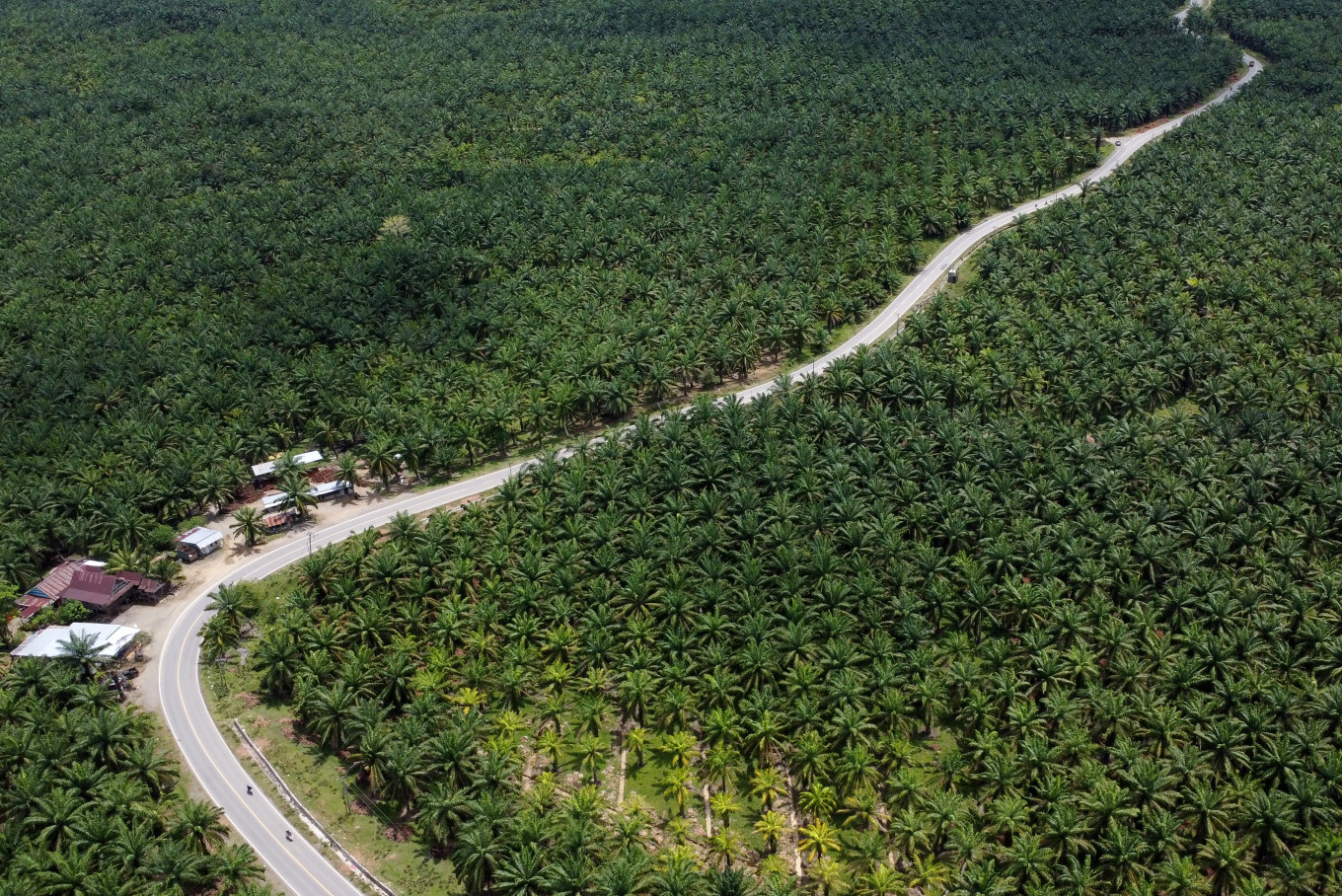Popular Reads
Top Results
Can't find what you're looking for?
View all search resultsPopular Reads
Top Results
Can't find what you're looking for?
View all search resultsBrazil seeks biofuel boom, but critics query climate impact
Biofuels now powering about a quarter of the transport sector in Brazil last year, with an estimated 762,000 jobs in related activities, according to a recent report by the International Renewable Energy Agency (IRENA)
Change text size
Gift Premium Articles
to Anyone
 An aerial photo of vehicles passing through a palm oil plantation owned by a company in Central Mamuju regency, West Sulawesi, on Oct. 29, 2025. The Indonesian Palm Oil Association (Gapki) recorded crude palm oil (CPO) production of 35.65 million tons by August 2025, a 13 percent increase compared to 34.522 million tons in the same period last year. (Antara/Akbar Tado)
An aerial photo of vehicles passing through a palm oil plantation owned by a company in Central Mamuju regency, West Sulawesi, on Oct. 29, 2025. The Indonesian Palm Oil Association (Gapki) recorded crude palm oil (CPO) production of 35.65 million tons by August 2025, a 13 percent increase compared to 34.522 million tons in the same period last year. (Antara/Akbar Tado)
U
nited Nations climate summit COP30 host Brazil is pressing nations to pledge to quadruple the global use of sustainable fuels by 2035, including biofuels, hydrogen and biogases, but environmentalists warn that making fuel from crops harms food security and nature.
"When land grows fuel instead of food, someone else must clear more land, or eat less," said Timothy Searchinger, senior research scholar at Princeton University. "Countries believe they are cutting emissions because biofuel emissions are counted as zero. In reality, they shift the pressure onto land and food systems."
That pressure is already visible in India, which has rapidly increased the percentage of ethanol in petrol and helped save some US$12 billion in oil imports in the past decade.
However, it has come at the cost of arable land being diverted to growing crops for fuel instead of food and drivers have complained about damage to their engines.
But Brazil's long-term growth in biofuels has been smoother, with biofuels now powering about a quarter of the transport sector last year, with an estimated 762,000 jobs in related activities, according to a recent report by the International Renewable Energy Agency (IRENA).
The head of the Toyota Foundation in Brazil, Roberto Braun, said Toyota had been active in biofuels in Brazil for 16 years, with sugarcane and corn plantations to make ethanol feedstock.
"This is a realistic and immediate solution to reduce carbon emissions in the transport sector, not only in Brazil, but in other nations, especially those in the Global South," he told the Thomson Reuters Foundation at the summit.
The International Energy Agency (IEA) said meeting Brazil's goal of quadrupling sustainable fuel use by 2035, which 19 countries have signed up to so far, would more than double global biofuel production.
Green backlash
But green groups are concerned about the impact of biofuels on demand for land and potential nature destruction, especially in biodiverse regions such as Brazil and Indonesia.
Brussels-based non-profit Transport & Environment (T&E) last month said global biofuel production emits 16 percent more carbon dioxide than the fossil fuels it replaces.
"When the [Brazilian COP30] presidency is pitching transition from fossil fuels and it mentions sustainable fuels in the next breath we have a roadmap for disaster," said Ruairi Brogan, a senior policy officer at wildlife charity Royal Society for the Protection of Birds (RSPB) UK.
Brazil's COP30 President Andre Correa do Lago looks on on the day of the opening ceremony of the UN Climate Change Conference COP30, in Belem, Brazil, on Nov. 10, 2025. (Reuters/Adriano Machado)"The biggest thing about the pledge is the scale. We don't have the land for that," he said.
In response to these concerns, Braun said over the last 25 years, 98 percent of the agricultural expansion to produce biofuels had happened on degraded lands, referencing the IRENA report.
He said ethanol blending was "not rocket science" and the technology was well established in Brazil and was being successfully developed in countries like India.
Stricter safeguards
Countries such as Brazil and India see biofuels as an opportunity to combine climate action and economic development with new jobs and supply chains for biofuels.
If biofuels development accelerates, it could lead to cumulative investments of $1.5 trillion across all sustainable fuel types by 2035, the IEA said, providing a welcome economic boost to emerging economies and rural regions.
But a letter signed by more than 100 scientists before COP30 said growing transport biofuel demand could require about 52 million hectares of cropland by 2030, roughly the size of Spain.
Without strict safeguards, subsidies and targets for crop-based fuels would deepen food and forest crises, they wrote.
"Safeguards, such as caps on food and feed crops, and no recognition of high-emitting feedstocks like palm and soy oil, are essential," said Cian Delaney, a campaigner with T&E.
He warned that when biofuel targets were first introduced in Europe, a wave of palm oil imports drove deforestation in Southeast Asian countries, including Indonesia.
There are greener ways of producing biofuels, such as from non-edible plants, agricultural residues or even algae.
But in India and elsewhere, these new technologies have struggled to scale.
Searchinger from Princeton cited a report that he co-authored for global NGO the World Resources Institute that said solar panels could generate more than 100 times as much usable energy per hectare as biofuels.
Despite these concerns, India has doubled down on its biofuel policies, and this year began selling petrol mixed with 20 percent ethanol, or E20, five years ahead of schedule.
The shift, the government says, has not only led to savings in oil imports, but also helped in avoiding 54 million metric tons of carbon emissions over the past decade.
But the rapid roll out has raised concerns about diverted crops and provoked a backlash from drivers.
Ramya Natarajan of the Center for Study of Science, Technology and Policy said India's experience showed how difficult it was to balance climate and food goals.
The Delhi-based think tank's analysis suggests India may need to grow between 4 million and 8 million extra hectares of maize by 2030 to sustain the E20 blend.
"The trade-offs will be hard to avoid," Natarajan said.









